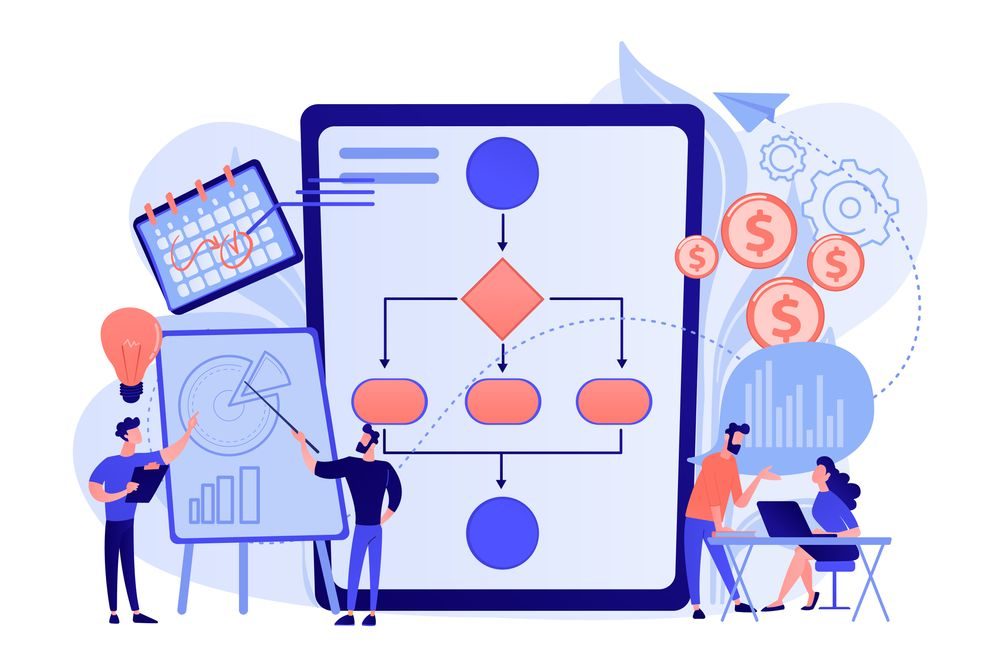Revenue operations is a relatively new field that is responsible for managing revenue-related activities and ensuring that an organization meets its revenue goals.
A revenue operations team typically consists of sales, marketing, and customer success operations professionals who work together to optimize an organization’s revenue streams.
Operations management has traditionally been focused on optimizing internal processes and ensuring efficient resource utilization. However, with the rise of the internet and the globalization of business, operations management has become increasingly complex.
As a result, organizations have begun to realize the importance of revenue operations in order to stay competitive.
How Do You Define Revenue Operations in Today’s Competitive Scenario?
Revenue operations is the term used to describe the alignment of an organization’s sales, marketing, and customer success efforts. A revenue operations team helps to optimize these functions in order to drive revenue growth.
The revenue operations team is responsible for a variety of tasks, such as developing and implementing pricing strategies, managing customer relationships, overseeing sales process improvement initiatives, and tracking key performance indicators.
The revenue operations field is expected to continue to grow in popularity in the coming years, as more and more organizations realize the importance of having a dedicated team of professionals responsible for managing revenue-related activities.
Furthermore, you’ll notice the imminent rise in job titles concerning RevOps such as VP Revenue Operations and Chief Revenue Officer apart from the usual revenue operations leaders seamlessly replacing the traditional way of addressing effective operations within an organization.

Why Should You as a Business Invest in Structuring an Effective Revenue Operations Team?
If you’re like most business leaders, you’re always looking for ways to improve revenue growth. And while there are a lot of different factors that can contribute to revenue growth, one of the most important is having an effective revenue operations team in place.
Revenue operations teams are responsible for ensuring that all the moving parts of the revenue engine are running smoothly and efficiently. This includes things like customer success, sales performance, marketing effectiveness, and financial reporting.
The process of governing a revenue operations team requires the entire organization to be agile and adaptable, with various departments working together to make changes, implement them, and ensure smoother transitions in aligning sales for lifetime customer satisfaction.
When these things are running smoothly, it leads to driving revenue predictability and growth. And that’s why investing in an effective revenue operations team structure is so important. It may cost a little bit up-front, but the long-term benefits will more than pay for themselves.
Do you want to develop an effective revenue operations team structure for your company?
Contact Growth Hackers
The Key Benefits of an Effective RevOps Team
Improving operational efficiency of the sales and marketing teams
Many companies struggle with better alignment between their marketing and sales teams. A big reason for this disconnect is that each team has its own process for tracking and managing customer data.
There are many organizations that use a siloed approach with disparate systems to manage operational teams that cause not just the revenue operations team members but also the managers, leaders, and sellers to manually bring together all customer data and form a coherent solution to solve the issues in their pipelines.
As a result, it can be difficult to get a clear picture of the customer journey from start to finish. By consolidating operations under a RevOps team, you can provide better alignment between marketing and sales.
In addition, you’ll be able to track customer data more effectively and get a better understanding of the customer journey. As a result, you’ll be able to better meet the needs of your customers and grow your business.
Better managing customer success operations and expectations
Customers today expect to be able to communicate with a company instantaneously and receive an immediate response. This is especially true when they are encountering problems with a product or service.
In order to meet these expectations, it is essential to have an effective RevOps team in place.
This team can help to smooth the handoff between departments, reduce waiting times, and provide the customer with the information they need in a timely manner. By better managing customer success operations and expectations, companies can provide a better overall experience for their customers.
Long-term cohesive alignment for strategic planning
A siloed structure is a common issue for many organizations. When teams are siloed, it can create contradictory goals and inhibit communication. This can cause inefficiencies and make it difficult to achieve organizational objectives.
A RevOps team can help to address these issues by facilitating communication and alignment across silos. This will allow every team to be aware of the organization’s goals and objectives and work together to achieve them.
In addition, a RevOps team can help to optimize processes and systems. This will improve efficiency and make it easier to achieve the organization’s goals. As a result, a revenue operations team can provide many benefits to an organization.

What a Revenue Operations Framework Looks Like
It’s best to think of revenue operations as a guiding framework rather than a hard and fast backbone to follow. There are multiple aspects of this framework that you can customize according to your business processes and needs.
Small businesses tend to slow down on the implementation of revenue operations in their business structure due to the operational and resource demands of this framework. And yet, in many startups, the revenue operations lead manager is often a one-man army.
A revenue operations framework will help break down the responsibilities, roles, and goals of the various departments involved in the organization while giving you a clear idea of the key areas to streamline in your go-to market teams.
Operations management
Operations management is a strategic efficiency process focused on the revenue-generating activities within an organization. The goal of operations management is to optimize the production and distribution of goods and services to generate revenue and create value for the organization.
The Revenue Operations Manager is responsible for the strategic planning and execution of the revenue operations strategy. This includes identifying and managing key revenue-generating activities, drafting an ideal revenue operations report, optimizing resources to maximize efficiency, and driving continuous improvement to increase revenues.
Revenue Operations Managers work closely with other members of the revenue operations team to ensure that all activities are aligned with the overall strategy and objectives. By optimizing the revenue operations process, the Operations Manager can help to ensure that the organization generates maximum value from its resources.

Start creating a successful revenue operations team structure today!
Work with Growth Hackers
Enablement
Enablement in the context of sales operations is the process of providing sales teams with the resources and support they need to be successful. This includes everything from sales training and coaching to product demos and technical support.
The goal of sales enablement is to help sales teams close more deals and accelerate the sales cycle. Enablement functions are typically divided between marketing and customer success, with each team responsible for different parts of the sales process.
Marketing is typically responsible for top-of-the-funnel activities like lead generation, while customer success focuses on post-sales activities like onboarding and customer retention. By working together, these two teams can provide sales teams with the comprehensive support they need to be successful.
Insights
An Insight team is a business function that’s responsible for providing data-driven insights to help move the business forward. The team sits at the intersection of business and data, and their job is to use data to understand what’s happening in the business and identify opportunities for improvement.
In most organizations, the insight team falls under the purview of the chief financial officer or chief marketing officer (CMO). However, the team can be located anywhere in the organization, as long as they have access to the sales data they need to do their job.
The primary goal of an insight team is to help the business achieve its desired success trajectory. To do this, they must first understand what success looks like for the business and then align teams and goals accordingly.
Once they have a clear understanding of the business’ goals, they can start to look at data and metrics to identify areas where the business’s revenue process is falling short and opportunities for improvement.
Ideally, an insight team should be made up of people with strong analytical skills and a deep understanding of both business and data. But more importantly, they should be passionate about using data to drive change and improve business outcomes.
Tools
When it comes to technology, there are a few key tools that can help drive predictable revenue. A CRM (customer relationship management) system is essential for managing customer data and tracking interactions.
Additionally, a good marketing automation tool can help create efficiencies in your marketing campaigns and lead nurturing. By using these tools, you can develop a comprehensive revenue operations strategy that helps you hit your numbers week after week, month after month.

Structuring a Revenue Operations Team
The good thing about structuring a revenue operations team is that there is no single solution or framework. Different-sized businesses require a varying degree of operational structuring to ensure they’re making the most of their resources.
Here are a couple of structures you can follow to see which best suits your business needs.
1. Following a revenue operations org chart
The purpose of a revenue operations org chart is to help you understand how your company’s revenue-generating departments fit together and what role each department plays in generating revenue.
Furthermore, the titular ladder begins with a CRO (Chief Revenue Officer) getting reports from the Director of RevOps, who in turn, oversees the operations of all managers of various business operations teams. The various area of operations include:
- Sales Operations Managers in charge of overseeing and leading the sales team
- Marketing Operations Managers in charge of marketing operations by the various marketing teams
- Customer Success Operations Managers who oversee all customer success operations teams
- Systems Operations Managers who ensure all consolidated data, technology, and approaches are effectively implemented for a better customer experience
Each manager has authority over the specific teams where expert analysts are designated for each area. The analysts report to the area manager and are expected to analyze, review, identify, and solve business performance issues after sifting through huge amounts of consumer data collected by the respective area departments.
2. Following a division and function-specific RevOps team structure
Division-specific structure
When starting fresh, the focus of many organizations can be division-specific, with only the following roles required in the revenue ops team.
- Sales Operations
- Sales Enablement
- Data, Insights, Analytics
- System Technology and related operations
This method works best for small startups with ample room for growth and expansion. Say you want to add in a customer success operations team to support the growing customer success needs.
At such times, revenue operations can be taken as the overarching reporting platform for all organizational operations.
Function-specific structure
Once a company has gained enough field expertise, it might want to move into other areas of operation like sales enablement, revenue forecasting, strategy-centric processes, and more.
So, when there is a specific division or operation leaders of teams responsible for a role like, say customer success, the entirety of customer success aspects are taken into account and considered by this single team/division, across the entire organizational funnel, end-to-end.
So, instead of forming unnecessary silos and disrupting the operations of revenue-generating teams, there is a seamless handoff of data and results, supporting sales productivity to the end.
Oftentimes, organizations face numerous challenges in implementing this function-specific change since they’re either not as willing to put in the resources or simply lack the existing talent to mass handle a specific area, say tech stack, across the various departments.
To counter this situation an organization needs to have a proper infrastructure and a wide range of talent to overcome the changes. You need to ensure perfect team alignment across primary areas like strategy, sales, success metrics, and data flow for dedicated sales cycles and to achieve revenue growth.
Final Thoughts on Revenue Operations Team Structure – The Methodology Explained
Much like a team sport, revenue operations is all about aligning your team towards a common goal and working together to achieve it. By consolidating customer feedback, data, and insights across the organization, you can develop a clear picture of what’s working and what isn’t.
This allows you to make strategic decisions that drive predictable revenue growth. By unifying your processes and creating a single source of truth, you can ensure that everyone is working towards the same goal.
The result is a more efficient, cohesive team that is better equipped to handle the ever-changing landscape of revenue growth.
If you’re willing to take that first step toward curating a successful business strategy, Growth Hackers is one of the best growth agencies that will lend you a professional perspective and platform to launch your ambitions. You may not be interested in a complete tour of investing in revenue operations and we understand that.
We will work with you to uncover more efficient and affordable ways of working on your ambitions through our globally successful business solutions. Contact Growth Hackers to know more about what we do and how we can customize our services to align with your business needs today.




